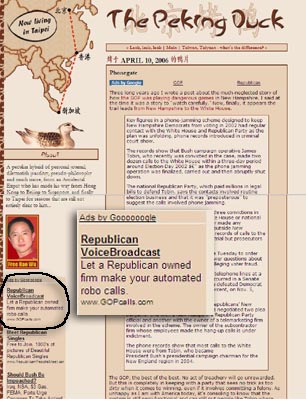The Big Debate today is over how long it will take for Iran to have the bomb.
Years, say analysts quoted in the New York Times.
Western nuclear analysts said yesterday that Tehran lacked the skills, materials and equipment to make good on its immediate nuclear ambitions, even as a senior Iranian official said Iran would defy international pressure and rapidly expand its ability to enrich uranium for fuel.
The official, Muhammad Saeedi, the deputy head of Iran’s atomic energy organization, said Iran would push quickly to put 54,000 centrifuges on line — a vast increase from the 164 the Iranians said Tuesday that they had used to enrich uranium to levels that could fuel a nuclear reactor.
Still, nuclear analysts called the claims exaggerated. They said nothing had changed to alter current estimates of when Iran might be able to make a single nuclear weapon, assuming that is its ultimate goal. The United States government has put that at 5 to 10 years, and some analysts have said it could come as late as 2020.
Andy Grotto at Think Progress explains:
Iran enriched the uranium using a cascade of 164 centrifuges that spin uranium hexafluoride gas at supersonic speed. This process extracts U-235—usable in power reactors and nuclear weapons—from the gas. The enriched uranium that Iran produced cannot be used in a nuclear weapon because it contains just 3.5% U-235, whereas a nuclear weapon typically requires highly-enriched uranium (HEU) that contains more than 90% U-235. Assuming Iran has perfect luck with the centrifuge, it would need to operate this cascade continually for more than five years to produce enough HEU (15-20 kg, roughly the size of a basketball) for a crude nuclear bomb.
To acquire a credible nuclear weapons capability, Iran’s next step is to use this successful experiment as the basis for building a 3,000 centrifuge cascade at Natanz, as Iran has frequently claimed it would do. In theory, such a facility would be capable of producing enough HEU for 2-3 bombs a year. Building such a facility, however, is far more difficult and demanding than operating the 164 centrifuge cascade.
Even if everything goes right, such a facility would not be fully operational until 2009 at the earliest. This is still too soon for comfort, but it does leave significant time for some hard-nosed diplomacy.
Even some rightie bloggers admit that Iran isn’t likely to have the bomb next week. This guy, for example, quotes a professor at the Woodrow Wilson School who said 2009 was the earliest possible date for the mullahs to build an atomic weapon.
And talking about 3,000 or 54,000 centrifuges makes the pre-Iraq invasion hysteria over the aluminum tubes and rumors that Saddam Hussein was trying to build a centrifuge seem all the more rinky-dink, doesn’t it?
Still, there is much talk of cascades and centrifuges on the Blogosphere today. My understanding is that building a whole lot of centrifuges and getting them to work together properly to make weapons-grade material is devilishly difficult and expensive — easier said than done — and also requires vast amounts of uranium and energy. Although I guess an oil nation has that last part licked.
Bottom line — no matter what anybody says, we shouldn’t have to bomb Iran this year. There seems to be general consensus on that point.
At the Washington Post, David Ignatius writes,
The emerging confrontation between the United States and Iran is “the Cuban missile crisis in slow motion,” argues Graham Allison, the Harvard University professor who wrote the classic study of President John F. Kennedy’s 1962 showdown with the Soviet Union that narrowly averted nuclear war. If anything, that analogy understates the potential risks here.
That doesn’t sound good.
Allison argues that Bush’s dilemma is similar to the one that confronted Kennedy in 1962. His advisers are telling him that he may face a stark choice — either to acquiesce in the acquisition of nuclear weapons by a dangerous adversary, or risk war to stop that nuclear fait accompli. Hard-liners warned JFK that alternative courses of action would only delay the inevitable day of reckoning, and Bush is probably hearing similar advice now.
Kennedy’s genius was to reject the Cuba options proposed by his advisers, hawk and dove alike, and choose his own peculiar outside-the-box strategy. He issued a deadline but privately delayed it; he answered a first, flexible message from Soviet Premier Nikita Khrushchev but not a second unyielding one; he said he would never take U.S. missiles out of Turkey, as the Soviets were demanding, and then secretly did precisely that. Disaster was avoided because Khrushchev believed Kennedy was willing to risk war — but wanted to avoid it.
But, um, Kennedy isn’t the guy plotting the course any more. And Bush and Cheney put together don’t have half the smarts that collected in JFK’s toe jam.
Ignatius continues,
What worries me is that the relevant historical analogy may not be the 1962 war that didn’t happen, but World War I, which did. The march toward war in 1914 resulted from the tight interlocking of alliances, obligations, perceived threats and strategic miscalculations. The British historian Niall Ferguson argued in his book “The Pity of War” that Britain’s decision to enter World War I was a gross error of judgment that cost that nation its empire.
Zbigniew Brzezinski, a former national security adviser to President Jimmy Carter, makes a similar argument about Iran. “I think of war with Iran as the ending of America’s present role in the world,” he told me this week. “Iraq may have been a preview of that, but it’s still redeemable if we get out fast. In a war with Iran, we’ll get dragged down for 20 or 30 years. The world will condemn us. We will lose our position in the world.”
For as long as I’ve known him, Bush has liked to muse aloud about his theory of “political capital.†His dad’s mistake, he told me more than once, was to have not spent the vast political capital he accumulated in 1991 as the “liberator of Kuwaitâ€â€”a failure that led, in his son’s mind, to Bill Clinton’s victory in 1992.
After the attacks on 9/11, after the successful (and globally popular) obliteration of the Taliban in Afghanistan, and after the midterm congressional elections of 2002, President Bush was sitting in the White House with a colossal pile of military, diplomatic and political capital in front of him. And then he pushed the entire pile to the middle of the poker table and bet it all on his predetermined decision to invade Iraq. I said at the time and still believe that it was one of the most momentous decisions any president had ever made.
Now, and largely as a consequence, Bush finds himself bereft of political capital at precisely the moment when he (and the rest of the world) needs it most. To use his father’s terms (from his 1989 inaugural address), we have neither the will nor the wallet to take care of business in and with the bullies in Iran.
Somebody — it may have been Fineman — said on Countdown last night that we spent our military capital on the wrong I-country.
Fineman goes on to say that the President is boxed in politically because he’s lost credibility with too many voters. He’s boxed in militarily because Iran is, well, not Iraq —
Saddam Hussein was a bellicose character, but Iran has four times the population and several thousand more years of unified national identity. Iran also has big-league ballistic missiles capable of reaching, and ruining, lots of places in the Middle East region, including Israel, Turkey and Saudi Arabia. Iran also has millions of Shia allies in Iraq who would regard (and be asked to regard) an attack on Iran as an attack on Shia Islam. One retired general I checked in with (who asked to remain unidentified because he sometimes is called on for counsel by the administration) says that American troops in Iraq—who’ve been working in many ways with the Shiite majority there—would risk coming under attack by them, especially if there was any effort to redeploy them.
Bush is boxed in diplomatically because, frankly, he needs to be able to work with the UN and the IAEA, not shove them around, and Bush and the UN/IAEA have, um, some history. And he’s boxed in economically because starting another war in the Middle East would send oil prices even higher.
I want to go back to what Fineman said about Bush and political capital: His dad’s mistake, he told me more than once, was to have not spent the vast political capital he accumulated in 1991 as the “liberator of Kuwaitâ€â€”a failure that led, in his son’s mind, to Bill Clinton’s victory in 1992. What Bush never understood is that “political capital” has a limited shelf life whether you spend it or not. Eventually, people start to ask what have you done for me lately? The Bushies seemed to think the free ride they got from 9/11 would last forever; that they could do whatever they wanted for the next seven years. I think only now it’s starting to sink in that the 9/11 boost is over.
I’m also reminded of what Ezra Klein said — “This White House was predicated on the belief that policies didn’t matter, only politics did. That’s been disproven, they’ve found themselves unable to fight failure with photo-ops.” For Bushies, policy is just a continuation of politics by other means. Bush blew his “political capital” on political games instead of substance. And now he’s broke and we’re bleeped.
Judging by past performance, whatever the Bushies choose to do about Iran will be the wrong thing. It may be that the best we can hope for is that nobody starts a war before we can pry the Bushies out of the White House. At least Tehran shouldn’t be able to make a bomb before then.



